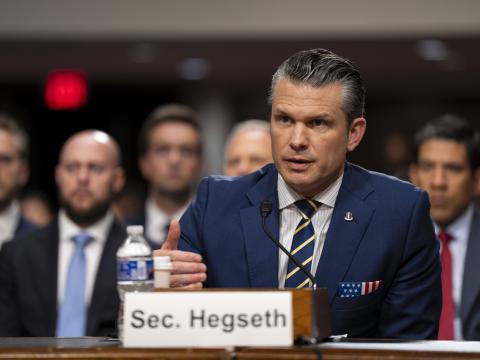We Really Have a Failure to Communicate
Recent reverses in Iraq and Afghanistan have led some experts, both appointed and self-designated, to complain that the facts on the ground may be bad enough—and they are—but far worse is the ignorance of the U.S. citizenry on what supposedly is really at stake in sand-blasted Mesopotamia or on the stony heights of the Hindu Kush.
Recent reverses in Iraq and Afghanistan have led some experts, both appointed and self-designated, to complain that the facts on the ground may be bad enough—and they are—but far worse is the ignorance of the U.S. citizenry on what supposedly is really at stake in sand-blasted Mesopotamia or on the stony heights of the Hindu Kush. Despite 12-plus years of terrorist-hunting, nation-building and counterinsurgency, somehow the word never got back to Joe and Jane Sixpack. Average U.S. citizens do not mind striking hard at those who attack us—indeed, the public rightly expects strong military responses to outrages such as 9/11. But as for hanging around year after year, attempting to drag unwilling indigenous cultures into the sunny uplands of Jeffersonian democracy … well, the ratings on that television series went south about 2006, with no comeback in sight.
Yet every time the locals in Iraq or Afghanistan embark on another round of roadside bombs and decapitations, certain of our best and brightest pop up to “educate” us about these things. You see them on news shows, or you hear them on talk radio, or you see their blogs online. Some are still in uniform or in government. Others are retired or presently out of power, commenting from the press box. Almost to a man and woman, they are true believers in shaping opinion on Main Street USA through “strategic communications”—strat comms for short—the idea that really smart, articulate insiders can influence public opinion by resorting to the same sorts of manipulative techniques that endeavor to convince us that Coke really is better than Pepsi or that a Ford is surely preferable to a Chevy.
Committed strat comms practitioners say they are careful to maintain a barrier between psychological operations—excuse me, “military information support operations”—shaping the overall information environment, propaganda for gullible local populations, deception cells targeting the enemy and public affairs office (PAO) attempts at describing military efforts for the folks back home. Yet all of these sections and teams share office space in military headquarters, attend the same effects boards and exchange technologies and insights. Somehow, though, we will sell snake oil to the foreigners and deliver only true-blue reality, admittedly well-packaged, to our own. Well, there is a reason people call PAO news accounts “stories.”
For years in both Iraq and Afghanistan, senior military leaders expressed chagrin when press reports featured a steady drumbeat of gloom and doom. Leaving aside some evident editorial slants—and those are present as long as humans assemble the news—the journalists were simply holding up a mirror to reality. Both Iraq and Afghanistan were indeed stalemates; some years better than others, some years not. But sustained progress proved hard to find. The news reflected that. Strat comms never moved the needle, then or now.
When reporters discovered such military attempts to steer the news, accentuating the positive and eliminating the negative (with apologies to Johnny Mercer), the journalists went nuts. Accusations of outright lying and resort to dark Jedi mind tricks did nothing to aid the war effort. After each major episode—the Pentagon’s short-lived Office of Strategic Influence (2002), the Lincoln Group’s attempts to salt good news into the Iraqi press (2005) or the idea of coaching retired flag officer analysts to shape media war coverage (2008)—the military leadership backed off. But the desire to turn the knobs and shape the news, to “educate” the good people of Peoria, kept creeping back. We just knew that some more strat comms would do the job.
The most senior U.S. uniformed officer at that time, Chairman of the Joint Chiefs of Staff Adm. Michael Mullen, USN, didn’t buy it. A Vietnam veteran who had seen an earlier generation of “Five O’clock Follies” press briefings happy talk degenerate into widespread public distrust, Adm. Mullen rejected the entire idea of strategic communications as indicative of “a certain arrogance.” Rather, the chairman suggested, when words match acts, when say equals do, credibility results. Forget the Madison Avenue slickster stuff. Tell it like it is. And if you cannot because of a need to protect ongoing operations, then say so. But do not hide bad news behind the veil of security. Tell the truth. The U.S. people can handle it.
Americans expect their military leaders to speak plainly. When you heard from Gen. George Patton, Adm. William Halsey, Gen. James Mattis or Gen. Curtis LeMay, you knew you would get it straight, no chaser. Each of those officers occasionally got in trouble for saying the wrong thing. But their fellow citizens believed them. As for the spinmeisters—Gen. George McClellan, Gen. Douglas MacArthur, Gen. William Westmoreland—history has not been kind to them, regardless of the military successes they achieved in their time.
What about strat comms? Well, a variation of it is a good name for a command dedicated to nuclear deterrence and space operations. But it is a bad idea when dealing with the U.S. public. Adm. Mullen was right. Dump the predigested talking points and clever spin. Just tell the truth.
Lt. Gen. Daniel P. Bolger, USA (Ret.), is a former troop commander in Iraq and Afghanistan. The author of seven books and numerous articles, he currently teaches at North Carolina State University.




Comment
WE REALLY HAVE A FAILURE TO COMMUNICATE
I enjoyed the article very much, It was telling the truth the way it should be done!
Comments